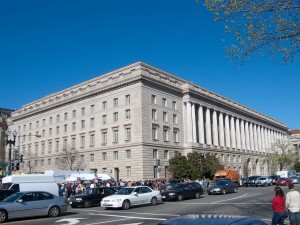The media likes narratives, probably because the public likes narratives. The media has been trying to shoehorn the three ongoing scandals at the White House – Benghazi, the IRS, and the Associated Press subpoenas – into a coherent story about this administration. This is difficult for several reasons, including the fact that the targeting of conservative groups by some IRS employees began in 2010, the ambassador’s death in Benghazi happened last year, and the subpoena of AP journalists’ phone records occurred more recently.

(by Cliff; from Wikimedia Commons; Creative Commons license)
It’s also difficult to craft a narrative when it’s unclear if the president had a role in any of the three controversies now swirling around the White House. The activities at the IRS were perpetrated by a rogue group of agents, whose efforts were rebuffed several times by higher ups at the agency (including the acting director who was just fired). The Justice Department’s subpoenas of journalists’ records appear to be perfectly legal, and were approved by the deputy attorney general. Despite months of effort by Congress and the press, there is little indication of a significant cover-up in the Benghazi affair. It appears that the State Department expressed concerns about some talking points that indicated the attack on the consulate had been planned, and the CIA quickly agreed to water down the briefs.
There is no denying that this has been a bad week for the Obama administration. And unlike many of the charges leveled by Republicans against the White House, these have merit. There is evidence of unseemly political maneuvering over Benghazi, illegal activities by some IRS agents, and disturbing (but unfortunately legal) uses of executive power against the AP. But while some are quick to label each scandal another Watergate, remember that Richard Nixon himself plotted the Watergate cover-up in the White House, and tried to fire high-ranking officials to impede the investigation.
If there is a thread to connect these events, it’s this: We’ve let the national security apparatus of our federal government flourish, while letting many other areas atrophy. Many Bush administration War of Terror policies have been maintained, and some, like the drone war, have been expanded. In the name of national security, the Justice Department has been ruthless at hunting down whistleblowers. President Obama made a calculated move to embrace a strong national security policy, and thereby blunt a key Republican advantage. This probably explains why the administration was worried about appearing to be caught off guard in the Benghazi attack, especially so close to the election.
IRS agents chose to select keywords like “Tea Party” when screening organizations applying for nonprofit status in order to manage the flood of new civic organizations. This suggests an agency that is understaffed and overwhelmed. There are reports that groups waited over a year for a decision about their tax-exempt status, if they received one at all. The Obama administration has never appointed its own permanent director of the IRS, keeping on a Bush appointee before naming an acting director (who was just fired). Some of the blame for unfilled appointments goes to obstructing Republicans, but Obama has been lackadaisical in filling many positions.
Other mini-scandals hint at this problem. Health and Human Services Secretary Kathleen Sebelius solicited healthcare stakeholders for funds to help implement Obamacare. Some members of Congress have expressed outrage, although Congress itself has been denying HHS the funds it says it needs to implement the law. House Republicans, failing to overturn Obamacare for the 37th time, are trying to “starve the beast” to prevent the law from being successful. Jon Stewart has shined a light on the huge backlog of claims, sometimes lasting years, at the Department of Veterans Affairs. It seems that profligate spending on national security doesn’t apply to soldiers after they’re done fighting.
Many new policy initiatives, like gun control, have been causalities of this era of gridlock. But so has the desire to make better the institutions we already have. The Obama administration has not fulfilled its promise to break with the previous administration and bring transparency to the executive branch. The White House, after having a few big, early victories has retreated to a defensive posture. It’s hard to blame them, with Republicans showing no desire to compromise. Republicans could serve as watchdogs of government excess, and put pressure on the White House to create a more efficient, effective government. But instead they’ve decided to be roadblocks, and wait for their return to power. Many conservatives would prefer less government, but it’s hard even for those in power to trim back government, so what we’re ending up with is ineffective government.
